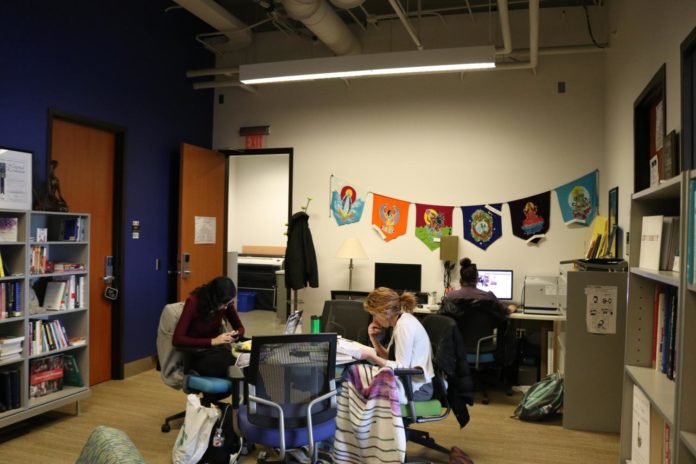According to the Rape, Abuse & Incest National Network (RAINN), “Among graduate and professional students, 8.8 percent of females and 2.2 percent of males experience rape or sexual assault through physical force, violence or incapacitation.”
April is Sexual Assault Awareness month, and the National Sexual Violence Resource Center states that the theme for this month is “Embrace Your Voice.” On the campus of Slippery Rock University, there are numerous resources that students can confide in regarding sexual assault. The Student Health Center, the Counseling Center, the Women’s Center, the Office of Student Conduct and even the University Police are resources that are available to students.
Sexual assault is not to be taken lightly. “More than 50 percent of college sexual assaults occur in either August, September, October, or November,” and “Students are at an increased risk during the first few months of their first and second semesters in college,” according to 2017 statistics from RAINN state.
Coordinator of Health Promotion Renee Bateman says, “I always recommend students download Just in Case for SRU. There is a section called ‘I’ve been sexually assaulted’ that can connect you to help on campus and off campus. There is also a section called, ‘How do I know if I was sexually assaulted?’ and ‘My friend was assaulted; how can I help?’ My advice is to visit bit.ly/srujicapp on your mobile device and save it to your home screen. This will provide you with easy access to support services and information on the topic.”
In terms of sexual violence, the Student Health Center is open 24 hours a day, seven days a week during the semester.
“In addition to providing nursing and medical care to students…including sexual assault and emergency contraception, Student Health Services (SHS) can also place you in contact with various community services. SHS is a confidential service which means we will protect your confidentiality. Title IX requires Student Health Services to report occurrences of sexual assault to the appropriate university officials; however, we will not disclose your name without your permission,” as stated in the Student Code of Conduct.
Through the Student Health Center, services such as Healthy Outreach through Peer Education (HOPE) and the Student Health Advisory Board (SHAB) raise awareness about sexual assault. HOPE offers numerous programs that focus on learning outcomes and personal development such as Sex, Drugs, and Pop Culture, as well as Bed Bugs which focuses on teaching students the importance of safer sex practices. SHAB provides students the opportunity to provide their input into health care services.
On campus, there are three areas that have confidential reporting status: Student Counseling Services, Student Health Center, and the Women’s Center.
Jodi Solito, director of the Women’s Center, says, “I have confidential reporting status, one of three areas on campus with that designation, which means I do not have to report names of students who come to talk with me about their experience with sexual assault or rape. This can be significant for students who are concerned about what will happen if they tell someone about the incident. Often times, students will not get the help they need to deal with an incident because they keep it to themselves.”
The Women’s Center is there for women and men who have experienced sexual violence so they can speak to the center about services and options that are available for reporting the incident. The Women’s Center maintains confidentiality. The staff will report the nature, time, date, and general location of the incident after consulting with the student that no personal details that could identify the student are shared.
“Sexual assault and rape are a serious public health problem in our society,” Solito stated. “SRU is no exception. However, sexual assault and rape does not look like a scene from Criminal Minds or SVU, and for many students, that’s what they think of when they think rape. Consequently, when they experience unwanted sexual contact but there is no violence, no weapon, they don’t call it rape.”
Most students are aware of sexual assault.
“How one defines sexual assault and rape may differ among people,” Solito said. “I often hear people use the term ‘regretted sex’ in place of rape – the thought being that, in a heterosexual example, the woman later regrets her decision to have sex, and subsequently defines her experience as rape.
This line of thinking is highly problematic. It implies that [heterosexual] women ‘cry rape’ or make false accusations against the man they had sex with. This is one of the most widely-spread myths that continue to permeate our culture.” 90 percent of sexual assaults and rapes go unreported. According to Solito, a reason for this may be “there is almost an expectation that women will be ‘taken advantage of,’ i.e. raped, at some point in her life because ‘that’s just how it is; in the world of sex and dating. We need to interrupt that thought process and reinforce the fact that all people have the right to agency over their body, and that setting boundaries is part of respecting oneself and one’s body.”
The number for the Health Center is 724-738-2052. The number for Student Counseling Services is 724-738-2034. The number for the Women’s Center is 724-738-2992. These are services that will maintain your confidentiality, but there are numerous other services on campus students can access in the case of sexual assault.








